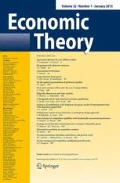Abstract
We reconsider the allocational invariance of equilibria to different formulations of market completeness. We identify the so-far neglected assumption of sophisticated behavior as being crucial. First, the Arrow–Debreu setting is considered, where markets do not reopen in the future. Second, sequentially complete markets are analyzed, where goods on the spot markets and all contingent one-period ahead commodities can be traded in every state. Finally, complete markets are analyzed, where all possible contingent commodities can be traded at every state. Preferences may be time-consistent or time-inconsistent. A distinction is made between naïve and sophisticated behavior.
We’re sorry, something doesn't seem to be working properly.
Please try refreshing the page. If that doesn't work, please contact support so we can address the problem.
References
Arrow K.J. and Debreu G. (1954). Existence of an equilibrium for a competitive economy. Econometrica 22: 265–290
Arrow, K.J.: Le rôle des valeurs boursières pour la répartition la meilleure des risques. In: Econométrie, colloques internationaux du centre national de la recherce scientifique. 40, pp. 41–47 (1953); English version: The role of securities in the optimal allocation of risk-bearing. Rev Econ Stud 31, 91–96 (1964)
Bergstrom T.C. (1975). Maximal elements of acyclic relations on compact Sets. J Econ Theory 10: 403–404
Chattopadhyay S. and Gottardi P. (1999). Stochastic OLG models, market structure and optimality. J Econ Theory 89: 21–67
Debreu G. (1959). Theory of Value. Wiley, New York
Donaldson J.B. and Selden L. (1981). Arrow–Debreu preferences and the reopening of contingent claims markets. Econ Lett 8: 209–216
Drèze, J.H., Herings, P.J.J.: Sequentially complete markets remain incomplete. METEOR Research Memorandum 03/44, Maastricht University pp. 1–13 (2003)
Haller H. (1990). Non-market reopening, time-consistent plans and the structure of intertemporal preferences. Econ Lett 32: 1–5
Hellwig M.F. (1983). A note on the implementation of rational expectations equilibria. Econ Lett 11: 1–8
Herings P.J.J. and Rohde K.I.M. (2006). Time-inconsistent preferences in a general equilibrium model. Econ Theory 29: 591–619
Loewenstein G., O’Donoghue T. and Rabin M. (2003). Projection bias in predicting future utility. Q J Econ 118: 1209–1248
Luttmer E.G.J. and Mariotti T. (2003). Subjective discounting in an exchange economy. J Political Econ 111: 1–30
Pollak R.A. (1968). Consistent planning. Rev Econ Stud 35: 201–208
Radner R. (1972). Existence of equilibrium of plans, prices and price expectations in a sequence of markets. Econometrica 40: 289–303
Svensson L.E.O. (1976). Sequences of temporary equilibria, stationary point expectations and Pareto-efficiency. J Econ Theory 13: 169–183
Author information
Authors and Affiliations
Corresponding author
Additional information
The author would like to thank the Netherlands Organisation for Scientific Research (NWO) for financial support.
Rights and permissions
About this article
Cite this article
Herings, P.JJ., Rohde, K.I.M. On the completeness of complete markets. Econ Theory 37, 171–201 (2008). https://doi.org/10.1007/s00199-007-0291-y
Received:
Accepted:
Published:
Issue Date:
DOI: https://doi.org/10.1007/s00199-007-0291-y

